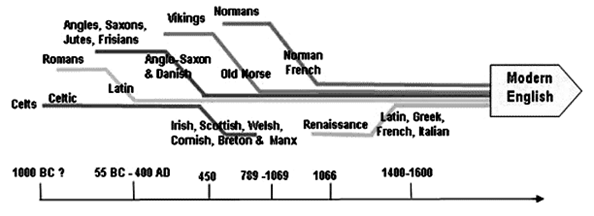 |
АвтоАвтоматизацияАрхитектураАстрономияАудитБиологияБухгалтерияВоенное делоГенетикаГеографияГеологияГосударствоДомДругоеЖурналистика и СМИИзобретательствоИностранные языкиИнформатикаИскусствоИсторияКомпьютерыКулинарияКультураЛексикологияЛитератураЛогикаМаркетингМатематикаМашиностроениеМедицинаМенеджментМеталлы и СваркаМеханикаМузыкаНаселениеОбразованиеОхрана безопасности жизниОхрана ТрудаПедагогикаПолитикаПравоПриборостроениеПрограммированиеПроизводствоПромышленностьПсихологияРадиоРегилияСвязьСоциологияСпортСтандартизацияСтроительствоТехнологииТорговляТуризмФизикаФизиологияФилософияФинансыХимияХозяйствоЦеннообразованиеЧерчениеЭкологияЭконометрикаЭкономикаЭлектроникаЮриспунденкция
The history of the English language

Britain is a small island and over the centuries it has been invaded many times. The earliest inhabitants were the Celts. They occupied Britain for possibly 1000 years, but then the Romans invaded in about 55 BC. The Romans, of course, spoke Latin, and as they brought Christianity to Britain, Latin was the language of the church, and therefore of all writing at that time – only the monks learned to write! But Latin did not stay as a spoken language after the Romans left in 400 AD.
The real origins of English come from the languages spoken by the tribes that invaded in “the Dark Ages” about 450 AD. They were the Angles, Saxons, Jutes and Frisians, often known as the Anglo-Saxons, who came from Denmark, Holland and Northern Germany. In fact, even the word “English” comes from the name of their language – “Englisc”, and the name “England” comes from “Angle Land”. The Anglo-Saxon languages gave English its shorter, informal words. Then more short, simple words were brought by the Vikings, who invaded from Denmark, Norway and Sweden between the years 789 and 1069.
But where did all the longer, more complex words come from? When the Normans (William the Conqueror) invaded Britain from northern France in 1066, they brought the French language, which had its origins in Latin (because the French were ruled by the Romans for so long). French words were much more complex than English words. They had more syllables and could be changed according to their usage in a sentence. The French language became the language of the Royal Court, and therefore also of the ruling and business classes. Latin was still the language of the church and English was the language of the common, uneducated man.
So, the Anglo-Saxon, Viking, Latin and Norman French languages are the main ingredients of modern English. The Renaissance period in Europe from the 15th to the 17th centuries, which was a time of great cultural and intellectual change, brought even more influences to English (as you can see in the picture), and of course, now English language takes words from all over the world!
Words originating from Latin and French are still used in the formal and business language of today. As a general rule, formal words are longer than informal ones. For example, the word ‘get’ is informal and the word ‘receive’ is more formal and business-like.
But what happened to the native Celts, the original people of Britain? The invading Romans, Anglo-Saxons, Vikings and Normans pushed the Celts to the far regions of Britain – to Scotland, Wales, Ireland and Cornwall. The languages of these regions are completely different from English!
Formal and informal English are completely different. Informal words are shorter, and come from Anglo-Saxon, and formal words are longer, and come from French and Latin.
Словарь
to invade [In'veId] вторгаться, захватывать, оккупировать
inhabitant [In'hæbIt(ə)nt] житель
Celts [kelts] кельты (общее название близких по языку племён, населявших Британию во время её завоевания англосаксами)
syllable ['sIləbl] слог
Romans ['rəumənz] римляне
Latin ['lætIn] латинский язык
Christianity ["krIstI'ænətI] христианство
church [CWC] церковь
monk [mAŋk] монах
BC (before Christ) до нашей эры (до Рождества Христова)
origins начало, истоки
tribe племя
Dark Ages Тёмные века, Раннее Средневековье (500 - 1100 н.э.)
AD [eI'di] (Anno Domini) нашей эры (от Рождества Христова)
Angles ['æŋglz] англы (древнегерманское племя). По их имени часть Британии стала называться Англией
Saxons ['sæksnz] саксы (древнегерманское племя)
Jutes [GHts] юты (древнегерманское племя)
Frisians ['frIzIənz] фризы (древнегерманское племя)
Viking ['vaIkIN] викинг
Norman норманн
Royal Court Королевский Суд
formal English официальный английский
informal English разговорный английский
Грамматика
Поиск по сайту: